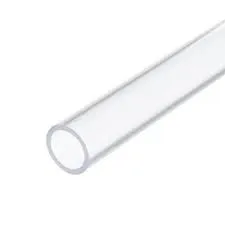Nov . 11, 2024 21:06 Back to list
cpvc pipe
Understanding CPVC Pipes Features, Benefits, and Applications
When it comes to plumbing and piping solutions, CPVC (Chlorinated Polyvinyl Chloride) pipes have gained substantial popularity due to their remarkable properties and versatility. Composed of thermoplastic materials, CPVC pipes offer a range of benefits that make them suitable for both residential and commercial applications.
What is CPVC?
CPVC is a resin made by the chlorination of PVC. This process enhances certain properties of the material, making it more suitable for high-temperature water applications. CPVC pipes are typically yellow or cream-colored and are widely used in plumbing, potable water distribution, and industrial applications.
Key Features of CPVC Pipes
1. Temperature Resistance One of the standout features of CPVC pipes is their ability to withstand high temperatures. They can handle water temperatures up to 200°F (93°C) without losing structural integrity, making them ideal for hot water supply lines.
2. Corrosion Resistance Unlike metal pipes which can corrode over time, CPVC pipes are highly resistant to chemical corrosion. This makes them suitable for a variety of environments, including those with acidic or alkaline substances.
3. Lightweight and Easy to Handle CPVC pipes are significantly lighter than metal alternatives, making them easier to transport and install. Their lightweight nature can reduce labor costs during installation without compromising on durability.
4. Low Thermal Conductivity CPVC pipes do not conduct heat as efficiently as metals, which helps in maintaining the temperature of the water within. This feature can lead to energy savings in water heating applications and minimizes heat loss.
5. Flame Retardant Qualities CPVC pipes are self-extinguishing, which reduces the risk of fire hazards in case of a fire outbreak. This flame resistance feature is crucial for ensuring safety in various environments.
cpvc pipe

Benefits of Using CPVC Pipes
1. Cost-Effectiveness Although the initial cost of CPVC pipes may be higher than that of traditional PVC pipes, their long-lasting durability and resistance to wear and tear can result in significant cost savings in maintenance and replacements over the long haul.
2. Ease of Installation The lightweight nature of CPVC pipes allows for easier handling and quicker installation. The joining processes, such as solvent welding, are straightforward, contributing to reduced labor costs and quicker project completion times.
3. Versatile Applications CPVC pipes are suitable for a diverse range of applications, including residential plumbing, commercial plumbing, industrial applications, and even agricultural uses. They are particularly effective in hot water systems, fire sprinkler systems, and other applications that require high durability.
4. Environmental Impact CPVC is a sustainable choice for plumbing. It is recyclable and does not leach harmful chemicals into water supplies, making it a safer option for potable water systems.
5. Regulatory Approvals CPVC pipes often meet or exceed industry standards for health and safety, thus gaining approvals from various regulatory bodies, which adds assurance for builders and consumers alike.
Common Applications of CPVC Pipes
CPVC pipes can be utilized in numerous settings. In residential builds, they are commonly used for hot and cold water distribution systems. In commercial buildings, CPVC is perfect for HVAC (Heating, Ventilation, and Air Conditioning) systems. They're also utilized in fire protection systems, offering an effective solution that meets fire safety regulations.
Moreover, in industrial applications, CPVC pipes can transport chemicals and corrosive materials safely due to their chemical resistance. They are also suitable for agricultural applications, such as irrigation systems, where durability and reliability are critical.
In conclusion, CPVC pipes stand out as a reliable, flexible, and efficient solution for various plumbing and piping needs. Given their advantageous properties and diversified applications, they continue to be a preferred choice for contractors and builders looking to provide long-lasting and effective plumbing solutions. As building codes evolve and the demand for durable materials grows, the role of CPVC in modern infrastructure is likely to become even more significant.
-
Premium PVC-M Water Supply Pipe - Durable & Efficient
NewsAug.02,2025
-
Premium PP Welding Rod: GPT-4 Turbo Enhanced
NewsAug.01,2025
-
HDPE Drainage & Irrigation Pipe - Durable, Efficient Solutions
NewsAug.01,2025
-
Premium PVC Transparent Pipe: Durable & Clear Solutions
NewsJul.31,2025
-
High-Quality UPVC Electrical Pipe for Safe Wiring Solutions
NewsJul.30,2025
-
Premium PVC Pipe Fitting Supplier – Durable & Leak-Proof Solutions
NewsJul.30,2025

